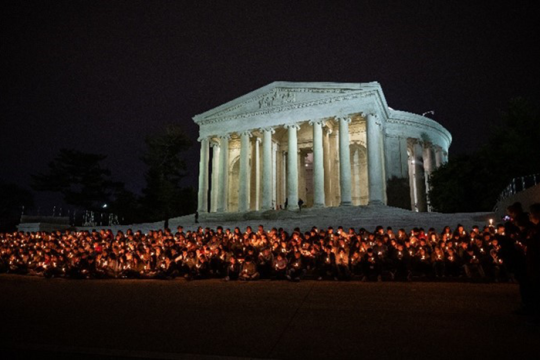As a kid, “Dayenu” was perhaps my favorite Jewish holiday song. It’s catchy, it’s upbeat, and, if you sing the full 15 verses, it goes on forever. With “Dayenu,” we express our thanks for the myriad miracles that took place at the time of the Exodus. We sing that each was so powerful that one alone would have been enough.
But in modern times, we are faced with the opposite situation for women in our society. We’ve seen significant cultural and political progress for women’s rights, yet these advances have not been nearly enough to ensure full equality for all women in our society.
In 1920, after decades of fighting for suffrage, women in the United States finally won the right to vote. The Nineteenth Amendment declares women’s equality in the voting booth, enabling women to participate fully in this key element of the democratic process. Despite gains in women’s civic and political participation over the last century, equality is not yet a reality. Women are sorely underrepresented in elected office, comprising 51 percent of the population but only 29 percent of elected officials at all levels of government and 19 percent of Congress.
Women’s suffrage is not enough.
In the 1960s, Congress took action to prohibit wage discrimination based on sex. Subsequent policy, like the Lilly Ledbetter Fair Pay Act of 2009 and President Obama’s 2014 executive orders, have strengthened legal protections against pay discrimination. Yet, more than 40 years after the Equal Pay Act of 1963, women on average earn only 78 cents for every dollar their male counterparts make. Women of color face an even greater disparity, with African American and Latina women earning an average of 64 and 54 cents on the dollar, respectively.
Take action today to urge your Senators and Representative to support the newly reintroduced Paycheck Fairness Act—for 78 cents is not enough.
In 1973, the Supreme Court ruled in the landmark Roe v. Wade case, which established a woman’s constitutionally-protected right to decide whether or not to have an abortion. Though this protection still exists, subsequent court decisions, state laws and federal policies have slowly chipped away at the decision, establishing significant obstacles to abortion access and diminishing reproductive rights.
We must continue to fight for safe, legal and affordable access to reproductive health care; without real access, legal rights are not enough.
In 1994, the Violence Against Women Act (VAWA) acknowledged for the first time that domestic violence and sexual assault are crimes under federal law. Yet, intimate partner violence, rape and sexual assault persist at unacceptable rates. We still need solutions for reprehensible sexual violence on college campuses and in the military, two contexts whose specific environments create unique challenges to preventing, addressing, reporting and adjudicating attacks. While policy at any level can improve violence prevention and response, only cultural change can eliminate the violence against women that threatens health and safety on such a large scale.
Without a significant shift in the way we think about violence against women, our efforts are not enough.
At your seder this year, remember that simply telling the story of Passover through the familiar narrative of redemption is not enough. Only placing a cup of water on the seder table or singing “Miriam’s Song” is not enough, but these are important, necessary steps you can take to start the conversation about women’s rights with your family and friends.
We must take action to combat the profound injustice of inequality. We must integrate into our daily lives a keen awareness that although we’ve made significant progress toward equal rights and equal treatment, we have not come far enough. We must educate ourselves and our neighbors to ensure that we move only forward in the long struggle for equality—for women and for all people. We will have brought our world closer to repair. That will be enough.
Related Posts
Image

Teens from North Carolina Speak About Environmental Justice
This year, as we approach Earth Day on April 22nd, we are amplifying the voices of our L'Taken participants. These teens, who are at the forefront of our fight for environmental justice and climate change, are not just the future-they are the present.
Image

Why is this Right Different?: City of Grants Pass, Oregon v. Johnson and the Passover Call to Action
As families prepare for the Passover seder and its celebration of freedom, the Supreme Court will hear a case in which the basic civil rights of unhoused people are at stake.
Image

Highlights from the 2023-2024 L'Taken Season
Another incredible L'Taken season has come to a conclusion! Over the 2023-2024 season, we had over 1,300 Jewish high schoolers from across North America join us in Washington, D.C. over our four weekends.
